Everything You Need To Know About Mobile Payments
There are about 10 million contactless mobile payment users currently in the UK.
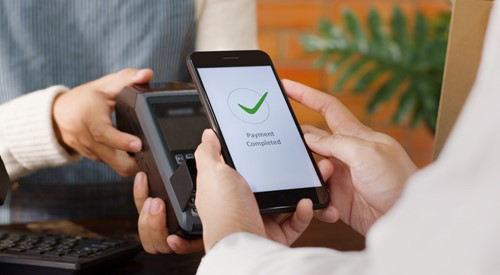
Roughly a quarter of all smartphone users have registered for a mobile payment app such as Apple Pay, Samsung Pay or Google Pay.
As a business, accepting mobile payments can increase your customer base (especially among younger consumers) and help you take more in-store and online payments.
But what are mobile payments?
How do they differ from other contactless payments?
And why, as a business owner, is it something you should care about?
That’s what we go through in this blog, starting with the basics.
What are mobile payments?
A mobile payment is a contactless payment made using a smart device like a smartphone, tablet or watch.
How do mobile payments work?
From a practical standpoint, they work the same as a contactless card payment.
A customer taps their device against the payment terminal to complete a transaction, and the transaction is processed instantly.
Mobile payments use the same near field communication (NFC) technology you’d find in contactless cards.
When the NFC chip in the smartphone or device gets close to the card machine, it sends a signal to the chip in the card machine, which triggers the transfer and authenticates the payment.
Mobile payments can be enabled in a couple of ways, but the most common today is to use a mobile wallet.
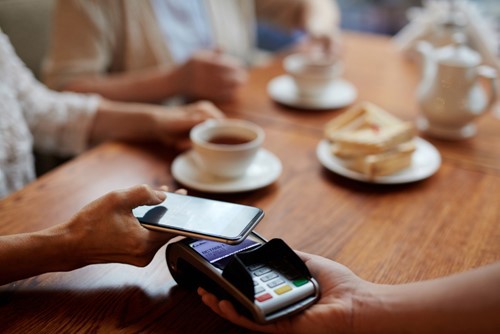

What is a mobile wallet?
A mobile wallet is an app on a smartphone or device that allows users to connect their bank and payment details to their phone via the wallet.
Most smartphone developers now have their own mobile wallets that come as standard on their phones.
The most common or well-known mobile wallets are Apple Pay, Samsung Pay and Google Pay.
As well as enabling contactless payments in-store, these mobile wallets can also be used for online payments.
Many banks also offer mobile apps which allow users to send or receive funds using mobile numbers.
What devices can be used for mobile payments?
Any mobile device that is NFC enabled and allows a customer to download a mobile wallet, or sync their bank and payment details to the device can be used for mobile payments.
The most popular device at the moment is smartphones, as they come with mobile wallets already installed and make it easy to sync the required details.
As we’ve already mentioned, around a quarter of all smartphone users in the UK have now signed up for mobile payment services like Apple Pay.
However, recently, many consumers have turned to wearable technology that is also NFC enabled.
One of the most popular forms of wearable payment technology is smartwatches.
These devices work the same way as the mobile wallets on a smartphone.
The customer’s details are synced to the wallet app on the device.
To make a payment, the customer simply opens the app, taps the device against the payment machine, and the transaction will be completed.

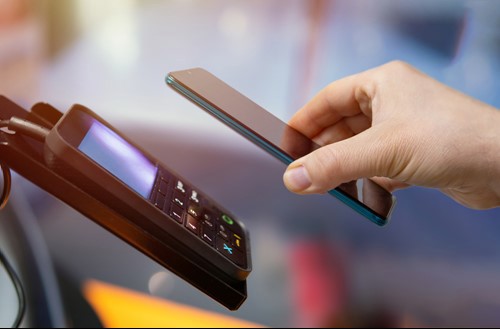
Why are mobile payments so popular?
Nearly two-thirds of customers in the UK would now prefer to use a mobile wallet on a smart device rather than use their debit or credit card, according to research commissioned by Samsung Pay.
By far, the most popular reason given for the preference for mobile payments is convenience.
More than 40% of customers said it was more convenient to carry their payment information on a single device rather than having multiple cards in a wallet.
More than half of those surveyed said they’d be happy to no longer get a physical payment card from their bank and would instead just use a mobile wallet.
Are mobile payments secure?
Yes.
Like contactless card payments, every transaction is encrypted, so there is no way of intercepting the payment information.
Mobile payments also require an additional security step through the smart device.
For example, on a smartphone, the customer will be required to enter their biometric data - like their fingerprint or a face scan - into their device before any payments are authorised.
If a smartphone is stolen, it’ll be much harder to get into the device and almost impossible to use contactless payments without this personalised information.
It’s also worth considering other security features being rolled out, such as strong customer authentication, which requires customers to complete other security steps before payment is authorised using their mobile device.
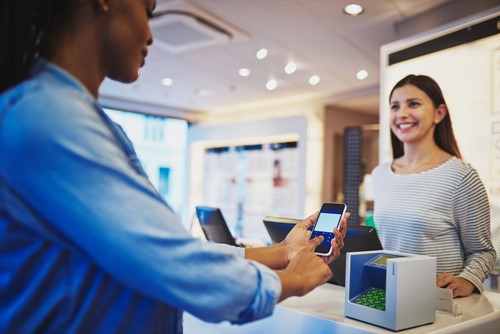
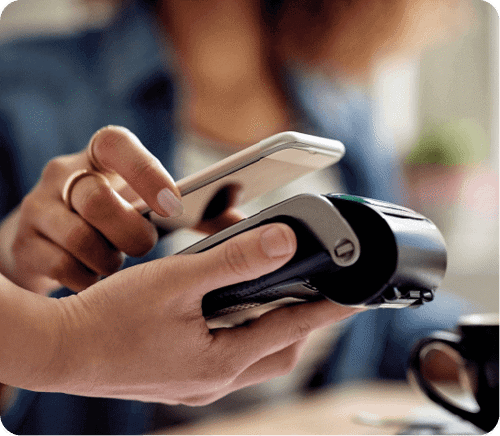
What are the benefits of mobile payments to businesses?
All this might sound great from a consumer standpoint, but what does it mean for businesses, and are you going to see any benefits?
In short, yes, you will.
As we’ve already mentioned, many customers are turning to mobile payments, so you’ll be able to attract a broader range of people by accepting them (most new contactless card machines accept mobile payments as standard)
They’re also highly convenient because they authorise payments instantly with the tap of a smart device against your card machine.
Mobile payments can also make it easier to sell online because mobile wallets can be used to complete online transactions very quickly.
It can also make it easier to run loyalty schemes for customers because they can link loyalty cards or tokens to the same mobile wallet storing their payment details.
You can run special offers and promotions to encourage more customers to shop with you using mobile payments.
Set your business up for mobile payments with a card machine from Handepay
While mobile payments might sound complicated, you don’t need any additional equipment other than a contactless card machine.
Mobile payments work in practice precisely the same as contactless card payments, so provided you have an up-to-date payment terminal, you’re already good to go.
With a card machine from Handepay, you can be up and running and ready to start accepting mobile payments quickly.
Plus, because we don’t charge hidden fees and offer flexible contracts from one-month rolling contracts if you switch to us, you get all the benefits of accepting mobile payments without the costs.
Want to find out more?
Would you like
a callback?
FIND OUT MORE
Talk to an advisor today...

